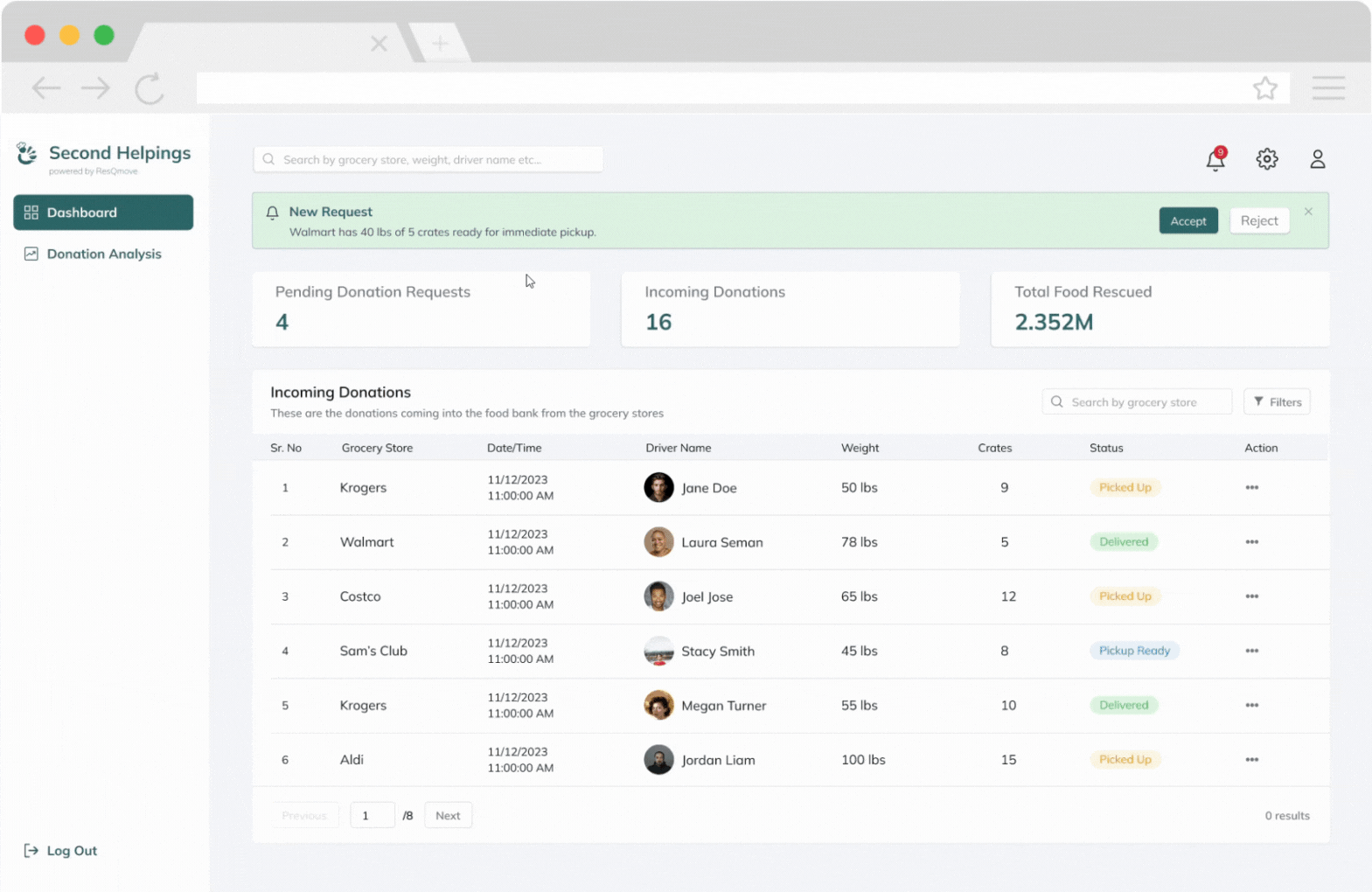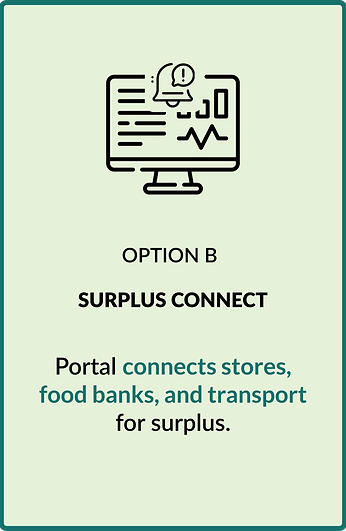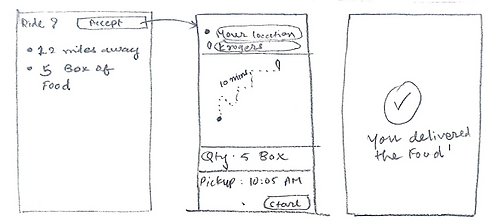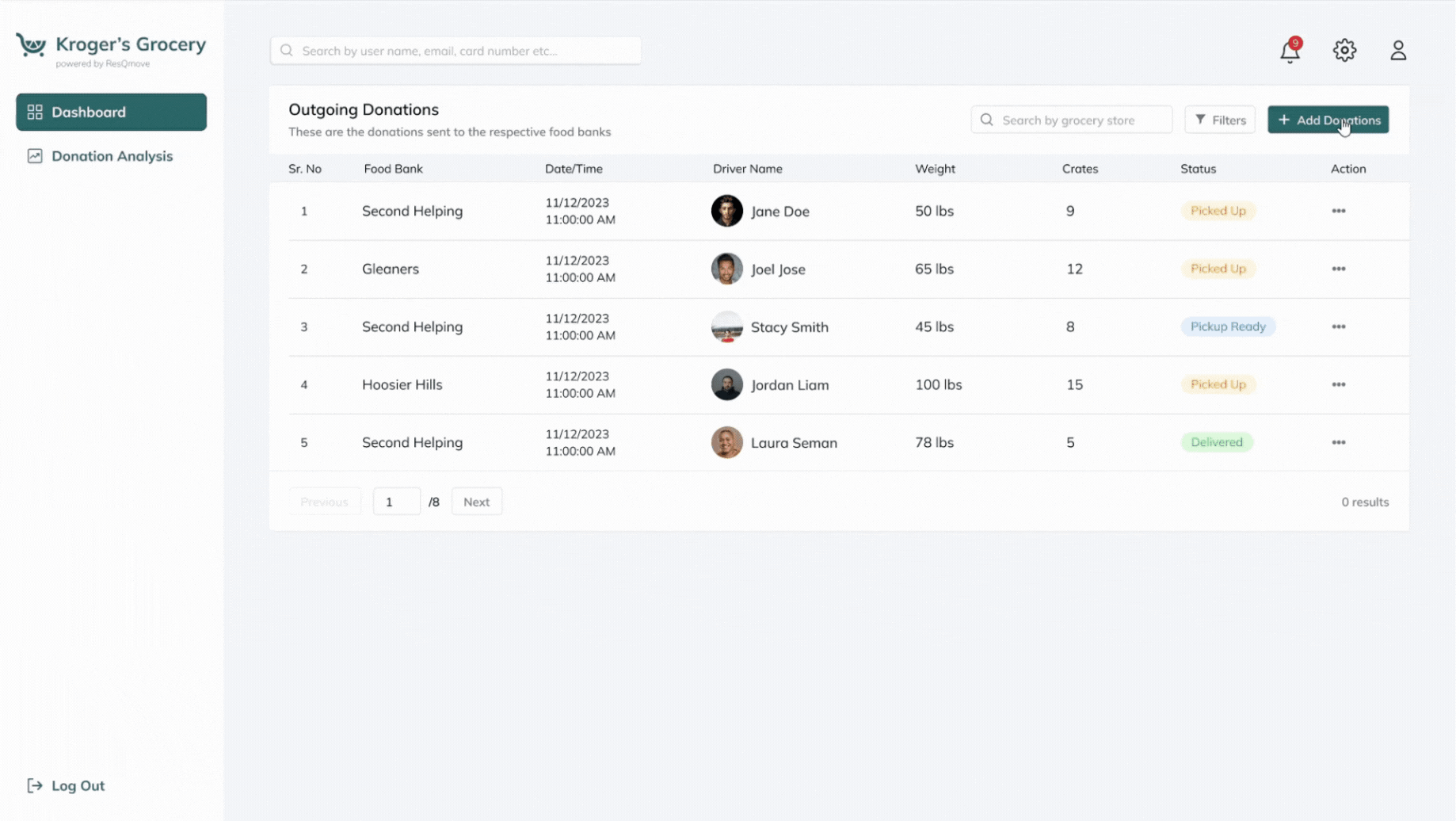ResQmove
Food waste is a pressing global issue, with one-third of all produced food going uneaten. I've explored the coordination of food information and logistics in the distribution of surplus food from grocery stores to small food banks, highlighting the global issue of food waste.
TEAM
4 Designers
TIMELINE
Oct - Dec 2023
PROJECT
Designed a digital platform to connect grocery store and small food bank better
MY ROLE
As a UX designer, I identified stakeholders, conducted user interviews with small food banks, researched competitors, designed the grocery dashboard, solved for the transport issue and led think-aloud sessions with small food banks.

PROBLEM STATEMENT
How might we help small food banks improve communication to obtain food information while enhancing logistics in Indiana State?
Success Metrics
These metrics are used to evaluate the effectiveness and success of the problem-solving process and the solution.

APPROACH & PROCESS
Understanding the food rescue network in the U.S. and identifying possible gaps in the system.
We explored the functioning of food organizations at different levels in the US and the challenges they face. Our aim was to understand how food banks gather information about food availability and transport it to their storage facilities.

BACKGROUND
In the United States, the food network operates on a hierarchy structure, where ascending levels indicate an increase in resources available for food banks.

44 million
people in the US face food insecurity
13.5%
households in Indiana experience food insecurity
13%
population in Marion County were food insecure
Grocery stores contribute to 40% of the US food waste problem.

WE VISITED

RESEARCH INSIGHT
Finding surplus food is a hassle. Users juggle emails from many large food banks just to learn what's available nearby.
Even though they might prefer to get surplus food directly from the source, they go through a large network of food banks just to find out what's available.
Transportation is a barrier to accessing surplus food.
Users often rely on limited truck availability and volunteers to pick up donations, which can be unreliable.


Similar issues are encountered by 139 small food banks in Indiana
TARGET AUDIENCE

GROCERY STORE

TRANSPORT SERVICES

SMALL FOOD BANK
BRANSTORMING
Various solutions were discussed with the team after the interview and further research.


DESIGN DIRECTION
Explored 3 options and opted for Surplus Connect as the solution to address both the communication gap and limited transportation issues.



SKETCHES
To try out a multitude of ideas and iterate them before settling on one.

.png)
.png)
SITE MAP


Sketching enabled me to swiftly generate and explore diverse concepts and ideas for organizing information, resulting in the final site map as depicted below.
MID FIDELITY
Advancing from the initial conceptual framework and organization of information into more detailed visual representations while still maintaining a level of flexibility for further refinement resulted in the creation of mid-fidelity designs.



SOLUTION & FINAL DESIGNS
ResQmove streamlines the donation process between grocery stores and food banks. Grocery stores notify nearby food banks of surplus food, specifying details. Food banks decide to accept or decline, and if accepted, the system assigns the nearest Transport Service driver.
The driver receives pickup details, and both the store and food bank track the driver's progress. Upon completion, a system log records for a successful delivery.

TO MAKE THE TRANSPORT WORK
I explored Amazon Flex a transport service as an option which was one of the insights from our interviews with food banks
Amazon Flex lets people use their cars to deliver packages for extra cash. We can integrate Amazon Flex as a transportation solution to get surplus food from grocery stores to the food banks.
They can get tax rebates for their donations of up to 30% depending on the charity.
FINAL DESIGNS
GROCERY STORE FLOW
The user clicks "Add Donation," scans food, sets pickup time, and posts on the Grocery Store Dashboard platform.

FOOD BANK FLOW
Small food banks view notifications, accept grocery store requests, and analyze individual donations on the platform.

AMAZON FLEX FLOW
Transport service receives trip confirmation from small food banks, navigates via the app, and delivers donations.


USABILITY TESTING
The solution underwent moderate usability testing using various methods, and the customer satisfaction for the solution was rated 3.5 out of 5.
Think-aloud Session
Think-aloud sessions with stakeholders revealed a smooth task completion rate of 85%. Based on insights gained, the design team iterated to address the issues raised by stakeholders by displaying information on the dashboard to facilitate better decision-making regarding requests.
System Usability Scale (SUS) Score
The System Usability Scale (SUS) was used to measure the overall usability of the application.
The mean SUS score was 82.5, indicating that users found the application usable, with improvement noted on the small food bank dashboard notification feature.
The iterative design process helped further align with stakeholder requirements.
ADD FOOD CATEGORY
The user must have the option to enter the type of food they are donating. To accommodate the transport vehicle and the food bank receiving it.

BEFORE

AFTER
POSTING NOTES
Before posting a donation the grocery store can add notes to address any special instruction the driver needs to follow in order to collect the food.

BEFORE

AFTER
IMPACT OF THE SOLUTION
The solution redefines the role of large food banks in communication.
Grocery stores and Small Food Banks can directly communicate on ResQmove.
Amazon Flex serves as a solution to limited transport completing the cycle for the solution

BEFORE RESQMOVE
.png)
AFTER RESQMOVE
LEARNINGS
-
It was interesting to learn about how food rescue works and what they need after talking to the stakeholders.
-
While seeking a solution, aim for an MVP (Minimum Viable Product) tailored to the specific problem, thus avoiding unnecessary complexities.
-
I learned to embrace an iterative approach, which only refined the product and added value over time.
-
Testing a solution after its creation is essential for validating, improving, and evolving the design system.
